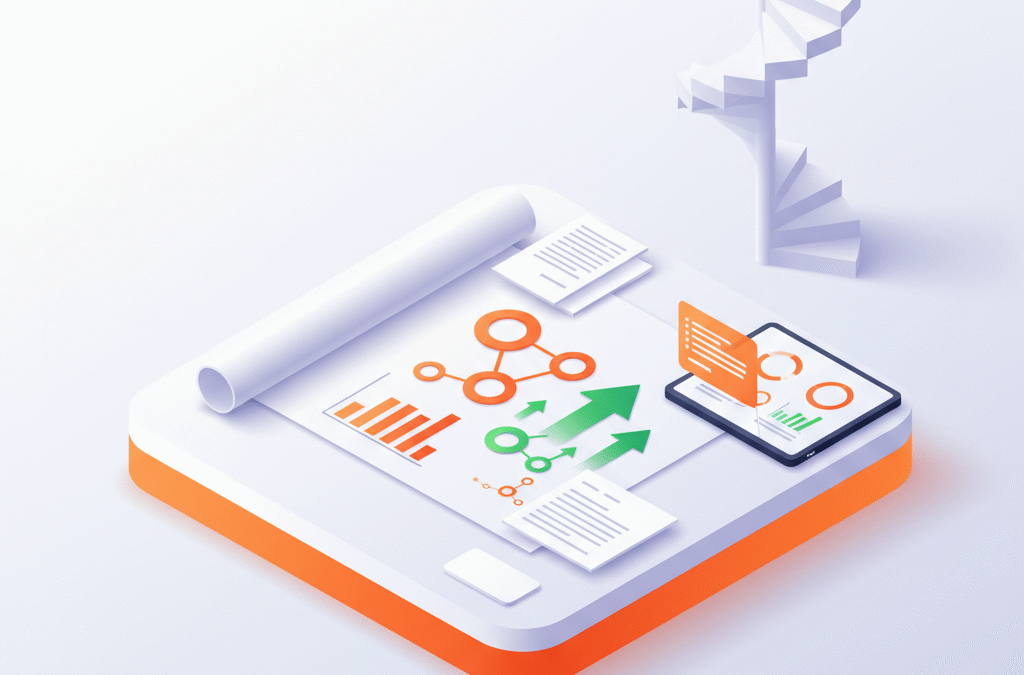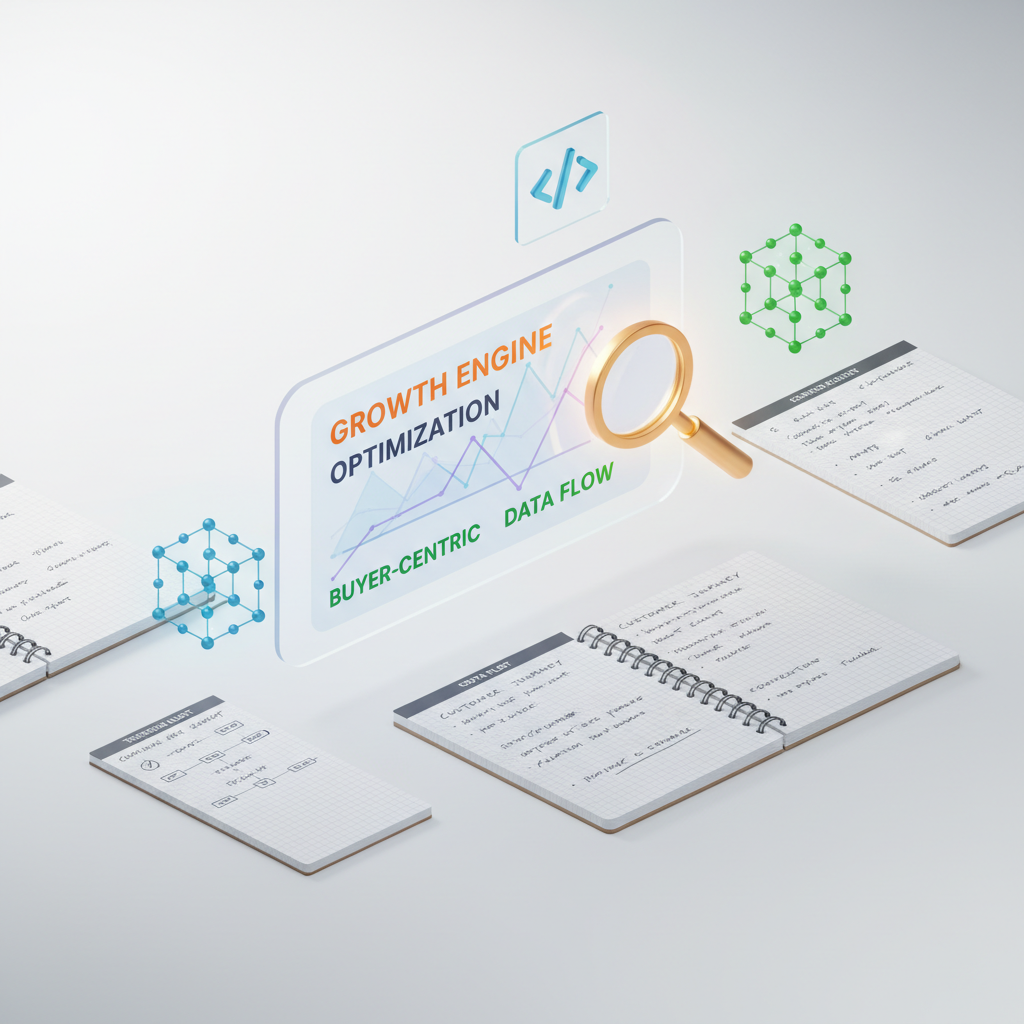Ecommerce SEO Company Services: The Agentic Blueprint
by ESSO Co | Oct 19, 2025 | Blog |

ecommerce seo company ecommerce seo services
Key Takeaways
- The ecommerce SEO landscape is rapidly evolving due to the rise of AI-driven search features.
- AI Overviews now appear in 13% of all searches, doubling since January.
- Traditional organic search results receive 64% fewer clicks when AI Overviews are present.
- ChatGPT processes 2.5 billion daily prompts, nearing Google’s 14 billion daily searches.
- Customers increasingly rely on AI recommendations before visiting product pages.
Ecommerce SEO Company Ecommerce SEO Services: The Agentic Blueprint
The ecommerce SEO landscape just shifted beneath your feet. AI Overviews now appear in 13% of all searches, double since January, and when they do, traditional organic results lose 64% of their clicks. Meanwhile, ChatGPT processes 2.5 billion daily prompts, rapidly approaching Google’s 14 billion searches. Your customers aren’t just searching differently; they’re asking AI what to buy before they ever see your product pages.
Ecommerce SEO companies optimize product visibility using AI-driven strategies, advanced keyword targeting, and tailored content to boost traffic and conversions amid evolving search behaviors.
I’ve spent the last 18 months rebuilding how we approach ecommerce seo company ecommerce seo services at ESSO Co, moving from traditional tactics to what I call Agentic SEO, where human strategy directs AI systems that work 24/7 to capture traffic across Google’s evolving results and the new answer engines. The brands getting this right aren’t just maintaining visibility; they’re compounding growth while their competitors wonder where their organic traffic went.
Here’s the blueprint that’s driving results for our 7 and 8-figure brands managing over $250M in combined annual revenue. If you’re ready to see how these strategies apply to your business, book a free AEO and SEO strategy call today.
What Is Ecommerce SEO, and Why Does It Matter Now More Than Ever?
Ecommerce SEO is the systematic optimization of online stores to capture customers at every stage of their buying journey, from discovery through purchase. But in 2025, it’s evolved far beyond traditional keyword targeting. Today’s ecommerce seo company ecommerce seo services must optimize for semantic search, AI-powered answer engines, and intent-driven discovery paths that span multiple touchpoints.
The stakes have never been higher. When AI Overviews appear, click-through rates to traditional organic results drop to just 15.8%. Your product pages might rank #1, but if you’re not structured for AI-powered answers, you’re invisible to the growing segment of buyers who rely on ChatGPT, Perplexity, and Google’s AI features to make purchasing decisions.
The new discovery journey maps to three critical intent phases: learning (“best protein powder for muscle gain”), comparing (“Optimum Nutrition vs Dymatize whey”), and transacting (“buy Optimum Nutrition Gold Standard 5lb”). Each phase requires different optimization strategies, content structures, and technical implementations that traditional SEO approaches simply can’t handle at scale. For a deeper dive into these evolving strategies, explore our blog for the latest ecommerce SEO insights.
Why Ecommerce SEO Is Critical in 2025
Modern buyers use AI assistants to research purchases, compare options, and validate decisions. If your products aren’t mentioned in AI-generated answers, they don’t exist in the buyer’s consideration set, regardless of your traditional search rankings.
What Does an Ecommerce SEO Company Actually Do?

An effective ecommerce SEO company operates as your organic growth engine, handling six foundational services: technical audits that catch revenue-killing crawl errors, keyword research that maps actual buyer language, content creation that converts browsers to buyers, schema implementation that feeds product data to search engines, strategic link building that establishes topical authority, and performance analytics that track revenue impact, not just rankings.
The game-changer is agentic automation. At ESSO Co, our AI systems run continuous site audits, generate optimized product descriptions at scale, monitor competitor pricing and positioning, and update schema markup automatically when inventory changes. What used to take weeks of manual work now happens in real-time, freeing our strategists to focus on high-impact decisions that drive compounding growth.
The measurable outcomes separate serious providers from the rest: 40-60% organic traffic increases within 100 days, first-page rankings for high-intent commercial keywords, and direct revenue attribution through enhanced ecommerce tracking. Our Shopify brands typically see 25-40% increases in organic-driven orders within the first quarter, with continued compound growth as topical authority builds.
ESSO Co’s Unique Differentiators
- Always-On AI Systems: 24/7 monitoring and optimization without human bottlenecks
- Revenue-Share Alignment: We succeed when you succeed, not just when we deliver reports
- AEO/GEO Ready: Built for Google and the new answer engines from day one
- 100-Day Traffic Sprint: Proven framework for rapid, sustainable growth
Ecommerce SEO Services vs. General SEO, What’s Unique, Why It Matters
Ecommerce SEO operates in a fundamentally different universe than general website optimization. While traditional SEO focuses on informational content and lead generation, ecommerce seo company ecommerce seo services must optimize product catalogs with thousands of SKUs, complex category hierarchies, inventory-dependent content, and transactional intent at every touchpoint.
The technical complexity alone separates the two approaches. Ecommerce sites require product schema markup for rich snippets, dynamic XML sitemaps that update with inventory, faceted navigation that doesn’t create duplicate content issues, and page speed optimization for image-heavy product pages. General SEO practitioners often lack the specialized knowledge to handle these commerce-specific challenges.
AEO and Agentic SEO become critical differentiators for ecommerce brands. Product data needs to feed into Google Merchant Center, Amazon catalogs, and AI answer engines simultaneously. This requires structured data implementation, automated content generation for scale, and continuous optimization based on inventory changes, capabilities that generic SEO approaches simply can’t deliver. For more on ecommerce-specific technical requirements, see Google’s official ecommerce SEO documentation.
| Feature |
Ecommerce-Specific SEO |
General SEO |
| Content Focus |
Product pages, category optimization, transactional intent |
Blog posts, service pages, informational content |
| Technical Requirements |
Product schema, inventory feeds, faceted navigation |
Basic schema, simple site structure |
| Scale Challenges |
Thousands of SKUs, dynamic inventory, seasonal updates |
Static pages, infrequent content updates |
| Revenue Attribution |
Direct sales tracking, conversion optimization |
Lead generation, brand awareness metrics |
Key Elements of a Successful Ecommerce SEO Strategy (2025 Edition)
The Agentic SEO stack for ecommerce brands combines seven interconnected elements: technical health monitoring that catches crawl errors before they impact revenue, intent-rich content creation that matches actual buyer queries, comprehensive structured data that feeds both Google and AI answer engines, automated internal linking that distributes page authority strategically, continuous performance monitoring that adapts to algorithm changes, and always-on competitive intelligence that identifies new opportunities.
Schema markup and rich media integration drive visibility in AI Overviews and shopping carousels. Product schema, review markup, FAQ structured data, and how-to guides create the foundation for AI-powered answers. When ChatGPT or Perplexity references your products, it’s often pulling from these structured data sources that traditional SEO approaches overlook.
The practical application happens through agentic content systems that can implement these elements across thousands of products simultaneously. Our AI agents analyze competitor pricing, generate optimized meta descriptions, update schema when inventory changes, and build topic clusters around product categories, all while maintaining quality control that would be impossible with manual processes. To learn more about implementing these strategies, check out our comprehensive ecommerce SEO resources.
ESSO Co’s 7-Element Ecommerce SEO Framework
- Technical Foundation: Site speed, mobile optimization, crawl efficiency
- Structured Data: Product, review, and FAQ schema implementation
- Content Authority: Buyer-intent content that converts browsers to customers
- Internal Architecture: Strategic linking that guides users and search engines
- External Signals: Quality backlinks from relevant commerce and industry sources
- Performance Monitoring: Real-time tracking of rankings, traffic, and revenue impact
- AI Optimization: AEO/GEO strategies for answer engine visibility
How to Choose the Right Ecommerce SEO Company (Founder’s Decision Framework)

The strategic checklist for evaluating ecommerce seo company ecommerce seo services starts with proven ecommerce experience, not just SEO experience. Look for agencies that understand product catalogs, inventory management, seasonal fluctuations, and the technical complexities of platforms like Shopify, WooCommerce, and Magento. Ask for specific case studies showing organic revenue growth, not just traffic increases.
Technology stack separates the leaders from the laggards. Modern ecommerce SEO requires AI automation, real-time monitoring, and agentic systems that can optimize at scale. If an agency relies solely on manual processes or can’t demonstrate their automation capabilities, they’ll become a bottleneck to your growth. Revenue-share alignment is equally critical, partners who tie their success to your sales results think differently about strategy and execution.
Five warning signs to avoid immediately: generic proposals that could apply to any industry, static monthly reports without actionable insights, poor communication during the sales process, no demonstrated experience with AI optimization or answer engines, and missing marketplace integration experience if you sell on Amazon or other platforms. For more on the broader context of search engine optimization, see this overview of SEO.
| Criteria |
Traditional Agency |
Freelancer |
In-House Team |
ESSO Co |
| Ecommerce Expertise |
Variable |
Limited |
Depends on hire |
Specialized focus |
| AI/Automation |
Basic tools |
Manual processes |
Limited budget |
Always-on agents |
| Speed to Results |
3-6 months |
2-4 months |
6+ months |
100-day framework |
| Revenue Alignment |
Fixed fees |
Hourly rates |
Salary costs |
Performance-based |
How to Implement Ecommerce SEO, Step-by-Step Action Plan for 2025
The founder-first implementation begins with a comprehensive technical audit that identifies revenue-killing issues: crawl errors blocking product pages, duplicate content across category filters, slow page speeds, and schema gaps that prevent AI engines from understanding your catalog. Once the technical foundation is solid, prioritize high-intent product and category pages for content upgrades, structured data, and internal linking. Deploy always-on monitoring to catch issues before they impact revenue, and use agentic content systems to scale optimizations across your entire catalog.
For a practical step-by-step guide and actionable checklists, visit our implementation resources for ecommerce SEO.
Troubleshooting & Quick Fixes, Solving Common Ecommerce SEO Issues
Most ecommerce SEO problems stem from technical debt accumulating faster than growth teams can address them. After auditing hundreds of Shopify and WooCommerce stores, I’ve identified the patterns that kill organic visibility, and the rapid fixes that restore it.
Critical Alert: 73% of ecommerce sites have at least one revenue-blocking SEO issue that can be fixed in under 48 hours. The most common? Duplicate content across product variants and category filters.
Low Rankings on Product Pages
Symptoms: Products rank on page 3+ despite having good reviews and competitive pricing.
Root Cause: Thin product descriptions, missing schema markup, or cannibalization between similar SKUs.
Immediate Fix:
- Add 150+ words of unique copy per product focusing on buyer questions
- Implement Product schema with price, availability, and review data
- Create distinct title tags using [Brand] [Product] [Key Benefit] format
- Internal link from related blog content using exact product names as anchor text
Expected Impact: 20-40% ranking improvement within 4-6 weeks.
Site Speed & Core Web Vitals Failures
Symptoms: Mobile page speeds above 3 seconds, poor Largest Contentful Paint scores.
Agentic Solution: Our always-on monitoring catches speed regressions the moment they occur, automatically compressing images and flagging render-blocking resources.
Manual Quick Fixes:
- Enable lazy loading for product images below the fold
- Compress hero images to under 100KB using WebP format
- Remove unused CSS from theme customizations
- Implement critical CSS inlining for above-the-fold content
Indexing & Crawl Errors
Most Dangerous: Product pages returning 404s after inventory updates, or entire category sections blocked by robots.txt misconfiguration.
Diagnostic Steps:
- Check Google Search Console for 404 spikes
- Verify robots.txt isn’t blocking critical paths
- Ensure XML sitemaps update automatically when products are added
- Test mobile-first indexing compatibility
Duplicate Content & Cannibalization
Common Triggers: Product variants creating separate URLs, category filters generating duplicate pages, manufacturer descriptions copied across multiple products.
Strategic Fix: Implement canonical tags pointing variant URLs to the main product page, use noindex on filter combinations, and create unique value propositions for each product.
The Answer Engine Opportunity, AEO/GEO for Brands Built to Compound Growth

While most ecommerce seo company ecommerce seo services still optimize for traditional blue links, the real growth opportunity lies in answer engines. ChatGPT processes 2.5 billion queries daily, Google’s AI Overviews appear in 13% of searches, and Perplexity is becoming the research tool of choice for high-intent buyers.
The shift is profound: customers aren’t just searching for products, they’re asking AI assistants what to buy, who to trust, and how to decide. If your brand isn’t mentioned in these AI-generated answers, you’re invisible to an increasingly large segment of buyers. For more actionable strategies on adapting to this shift, read our latest ecommerce SEO guidance.
ESSO Co’s AEO/GEO Framework
Our Agentic SEO systems optimize content for both traditional search and AI answer engines simultaneously. Here’s what works:
Structured Data Excellence: Beyond basic Product schema, we implement FAQ, HowTo, and Review schemas that AI engines parse for comprehensive answers.
Table-First Content: AI assistants love structured comparisons. We create comparison tables, feature matrices, and specification grids that become citation sources.
Question-Answer Optimization: Every product page includes buyer questions extracted from support tickets, reviews, and competitor analysis, formatted for snippet capture.
Multi-Format Content: The same information presented as paragraphs, lists, and tables increases citation probability across different AI models.
3 Immediate AEO Actions
1. Create Buying Guide Tables: Build comparison charts for your product categories with specific, measurable features. AI engines cite these more frequently than prose descriptions.
2. Answer Real Customer Questions: Mine your customer service logs for common questions, then create dedicated FAQ sections with schema markup. Format answers in 2-3 sentences for optimal AI parsing.
3. Optimize for Voice Search Patterns: Include conversational phrases like “best [product] for [use case]” and “how to choose [category]” in your content headers and meta descriptions.
Case Study: A Shopify electronics brand implementing our AEO framework saw 40% growth in organic traffic within one quarter, with 60% of new visitors coming from AI-influenced sources and answer engine citations.
Frequently Asked Questions
How has the rise of AI-driven search features like AI Overviews impacted traditional ecommerce SEO strategies?
AI Overviews now appear in 13% of all searches and have cut clicks to traditional organic results by 64% when present. This shift means ecommerce SEO strategies must move beyond ranking for blue links to optimizing for AI-powered answer engines that influence buyer decisions before they even visit product pages.
What specific services do ecommerce SEO companies provide to help brands adapt to evolving AI-powered search behaviors?
Ecommerce SEO companies offer AI-driven keyword research, content optimization tailored for semantic search, structured data implementation, and AI answer engine optimization (AEO). They build always-on AI content systems that combine human strategy with automation to capture traffic across both traditional search and emerging AI-powered discovery paths.
Why is optimizing for semantic search and intent-driven discovery important for ecommerce SEO in 2025?
Semantic search and intent-driven discovery allow brands to align content with how AI interprets user queries, improving visibility in AI Overviews and answer snippets. This approach captures customers earlier in their buying journey, increasing the chances of influencing purchase decisions in a landscape where direct clicks to product pages are declining.
How can brands effectively implement an Agentic SEO approach to maintain and grow their organic traffic in the current search landscape?
Brands should combine human-led strategy with AI-powered execution, setting clear traffic goals, identifying key prompts to own, and deploying scalable AI content systems with quality control. This Agentic SEO approach ensures continuous adaptation to search evolution, turning AI disruptions into compounding growth rather than lost visibility.
About the Author
Vijay Jacob is the Founder of ESSO Co, Ecommerce SEO services, agency & consulting – a FosterFBA brand.
ESSO Co specializes in programmatic SEO and AEO (Answer Engine Optimization) for ecommerce brands and operates under FosterFBA (founded in 2018).
Over the past 6 years, our expert team of Ad & SEO Specialists, and a 24/7 stack of specialized AI Agents, has helped 100+ Amazon & Shopify brands unlock their potential, driving more than $100M in additional annual revenue. If you’re an ambitious brand owner ready to scale, you’re in the right place.
🚀 Achievements
- Managed $30M+ in annual client ad spend, delivering $100M+ in ad revenue yearly.
- Helped brands scale from 6-figure ARR to 7 and 8 figures annually.
- Clients see an average 52% surge in ad revenue within weeks.
- 16+ month average client retention, reflecting durable results and trust.
🔍 Expertise
- Data- and systems-driven growth strategies.
- Programmatic & Agentic SEO/AEO built for Google and modern answer engines.
- Comprehensive brand audits to uncover growth opportunities.
Ready to elevate your ecommerce brand? Let’s make this your breakthrough year.
Book a free discovery call to see if our Agentic SEO/AEO growth system is right for you.
Last reviewed: October 19, 2025 by the eCommerce SEO Services Co Team




